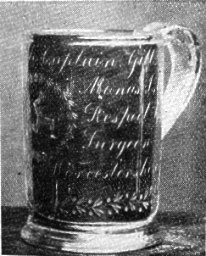
PRESENTED TO CAPTAIN GILL
(by Isaac Downing)
AND FILLED IN HONOUR OF HIS SEAMANSHIP.
[Taken from Tourist #2 1897]
By the Rev. T. E. Brown, M.A.
CAPTAIN GILL was a native of Glen Aldhyn, near Ramsey. The Glen is locally known as"' The Gill," and the Gills of these parts used to be called indifferently " Gills," or " Killeys," that is, people of the Gill, or Glen.
Our worthy Captain, however, had more to do with the long troughs of the sea, and its mountain waves, than with the pastoral seclusion of the beautiful Northern vale. His sister was a Mrs. Macnight, and he had a nephew, John Macnight, who became the Commodore of the Company's engineers. John Macnight was a school fellow of my brother's at the Douglas Grammar School, St. Matthew's.
A great occasion arose in the history of the Isle of Man Steam Packet Company, no less than an " Opposition." It was, I think, the second of the kind, its hero not being the " St. George," but the "Monarch." Party feeling ran high in Douglas; the Grammar School boys were vehement and enthusiastic supporters of the Old Company, which was hardly old, but supposed to be invested with a certain prestige, or halo, or what you like. This seemed to identify the Old Company with Conservatism, and the boees were full of true-blue prejudices and contempt for the upstart " Opposition "
My brother Hugh, afterwards so well known as the minister of Myrtle Street Chapel, Liverpool, was as strong a Conservative as any of them. And one of his friends, was his schoolfellow, John Macnight. John Macnight, Captain Gill's nephew. was sure to share these aristocratic sentiments. That disgusting "Opposition," that seedy lot, that presumptuous, good- or-nothing concern! How did they "dar?" Aye, and a black chimney, forsooth, whereas our chimneys were red with black tops! Black chinmeys, how absurd, how disgraceful, not to say piratical !
The lads lashed themselves into frenzy. My brother was a bit of a poet in those days, and, instigated by his Fidus Achates, Macnight. he wrote a tremendous diatribe, condemning to regions unmentionable this lewd invention of the Evil One. The Grammar School applauded, adhered. The Captain's nephew was appointed to present the poem to the great man himself. It is rather lamentable, but I only retain one phrase of the Satire. In it the wretched "Monarch" is condemned as a "rotten bag of nails." No doubt there were rhymes to "nails "--tails, Wales, scales, flails, gales, mails, etc., supplying a whole batch of bouts rimës to the youthful but abusive bard. I should like to try my hand at a reproduction, but fear your readers would object. So I will simply- follow the fate of my brother's composition as, presented by the nephew, it lay trembling on the knees of the great Captain. " And how do you like it? and what do you think, Uncle?" Then spake the Oracle: " It's middlin'." Dear old Captain! genuine old Manxrnan ! and I've no doubt- "it's middlin' it was, for all."

PRESENTED TO CAPTAIN GILL
(by Isaac Downing)
AND FILLED IN HONOUR OF HIS SEAMANSHIP.
How we gloried in our Old Company, identifying it with the first principles of honour, and integrity, and absolute righteousness! How we hated the "Monarch," and all her works! You must remember we were nearly contemporary with the beginning of the great " Sea-change " ; we took it into our very souls. And this abominable " Opposition "-why, it was intolerable. Political economy was not, I should say, taught by the Rev. S. Gelling, Master of the Douglas Grammar School. Under its influence, we have diverged since then, and may even have enlisted in the ranks of bogus speculators-who knows? lint, as boys, we had no misgivings. We went to see the " Queen of the Isle " come in, confident of her triumph. Manx, Manx, intensely 'Manx, we hailed her unquestioned superiority with delight. Our steamer, Sir, our " Queen of the Isle !" What a supreme moment that firing of the gun! Yes, the Firing of the Gun ! I do not think we believed the " Monarch " had a gun to fire. What a miserable concern ! Of course she didn't carry the mails! Pooh ! wouldn't be allowed to fire, not allowed! not her not an ounce of powder, bless ye ! Catch her trying ! we'd stop it! In short, the -Monarch" was a nuisance, a delusion, and a snare, and a disgrace to our' national waters.
The old boats were of wood, and the last of these was built in Douglas, in Windram's yard. She was the " King Orry," first
of that name. I cannot say over how many other " tea-kettles," more or less magnificent, Captain Gill presided, before he
himself was taken in tow, and brought, like the " Fighting Tëmëraire," to his last moorings in 1858. What I know
is, that he bore to them the reputation of a fine commander, a true, modest gentleman and sailor, and that he left in the
hearts of us boees the devoted affection of the many
generations who had grown up to love and admire him.
LAST month I endeavoured to give an idea of the startling contrast between the old Mona's Isle of 1830, and the Empress Queen of 1897. In so doing I naturally referred to the amazing growth and singular history of the Isle of Man Steam Packet Co. I think it has been called the romance of business, and, from its old records, not inaptly so called either. Many readers have indicated, by divers means and in different ways, that general pleasure was derived from a study of the older portion, which I will call Manx Lore. Thus I feel agreeably encouraged to touch again on both the old and the new, even though it only be to briefly describe the different pictures which I now publish. Mr. Brown has given us quite an insight into the character of Captain Gill, the first Commodore, and, next month will follow with his pleasant notes, but about Captain Quayle, who came after. These two grand old " seadogs" were of quite opposite characters, :although each excelled most of their contemporaries in the art and skill of navigation
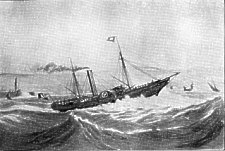
THE CRACK STEAMER, "QUEEN OF THE ISLE" (1834),
AND VICTOR OVER THE "MONARCH- OPPOSITION.
I have already shewn the little Mona's Isle, the first steamer, and this month I am pleased to add the Queen of the Isle, the good ship which came third. The second vessel was called the Mona : she was much the same as the Isle, though slightly smaller, yet she carried cargo while the Isle did not Both these steamers had their paddles " for'ard," but the Queen of the Isle, like those of the present time, had hers amidships.
I wish the passengers of to-day, who think so little of a three-and-a-quarter hours' passage by the Queen Victoria, would stay a moment, turn to the picture of the Queen of the Isle, and try and imagine what their fathers all grandfathers had to put up with. When she was launched on the 3rd May, 1834, the Glasgow. Herald, a journal never given over much either to sentiment or exaggeration, said :--" There was launched "on Saturday a new vessel called the Queen of the Isle, to ply between Douglas and Liverpool. This vessel has, by competent judges, been pronounced one of the finest specimens of naval architecture that has ever floated, and it is confidently expected that, when completed, she will be unrivalled in speed or comfort. Her saloon was no less than twenty-seven feet long! and the piston rod from the engine works on deck! Of course she was wholly built of wood.
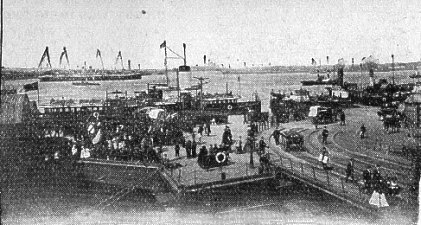
LIVERPOOL LANDING STAGE: THE FLOATING BRIDGE.
All this seems hardly credible in the days of steel ships; enormous engines, deep down below; twenty-five knots, and saloons lit by electricity. Nevertheless those who preceded us travelled by, and thought much of, the ship I mention.
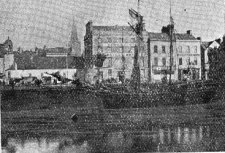
"A Bit of old Douglas"
Even then Douglas had great reputation as a watering place, for the Steam Packet Company was in its fourth ,year.
Contrast this with our Year of Jubilee and the launch of the Queen of the Isle, as described, with that of the Empress Queen, as pictured, the photo being taken at the moment the great ship was ready to leave the ways.
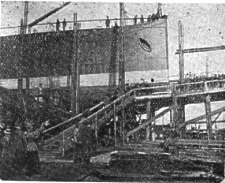
THE LAUNCH OF THE "EMPRESS QUEEN.
Scene at the monent of making ready
Mr. J. A. Mylrea, the chairman, and Mr. T. P. Ellison, the manager and secretary, are naturally present, but, being rather difficult to distinguish, I have the pleasure of giving their portraits separately.
While on the subject of portraits, the thought occurs to me that while much of this noble corporation's success is due to the sterling character of its leaders, it yet is almost equally dependent on like qualities in its humbler servants. I am therefore gratified in adding photographs of Pierrnan Kewley, widely known as "Dawsey," and of Edward Skillicorn, the mate of the Ellan Vannin. Both these are excellent fellows, whose friendship one is proud to be allowed to claim. I append some slight particulars under each picture.
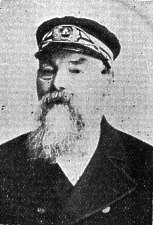 EDWARD SKILLICORN, Mate of the " Ellan Vannin." he is a typical Manxman, and has sailed in the Packet boats longer than any other servant of the Company. |
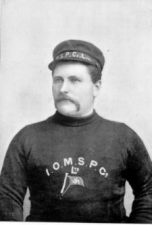 PIERMAN KEWLEY, Who is known far and wide as "Dawsey." He is a fearless swimmer-jumps in, heavy boots and all, at any time, and has probably saved more lives than anyone in the Isle of Man. |
Finally there remains the old notice. This has quite a history. In the fifties the Manx Fairy, a steamer owned in Ramsey, ran violent opposition to the Steam Packet Company. She was a fine and fast boat, and in many ways creditable to those in charge of her. When she ceased running the old notice in question was almost the sole acquisition the old company became possessed of, and, as it bears the (although obliterated) name of the Fairy agent and two later steam packet agents it is valuable.
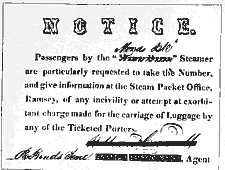
Next month I perhaps may be allowed to dive still deeper into these quaint affairs and singular contrasts.
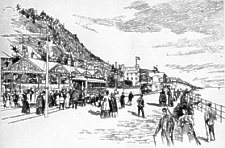
THE FAMOUS ELECTRIC RAILWAY: A CAR LEAVING DOUGLAS.
A YEAR or two ago visitors to the Isle of Man looked upon a coach ride to Castletown or Ramsey as the acme of enjoyment. This-save the trip round the Island was the finality of pleasuring, for, so it occurred to them, nothing then remained to be provided for their edification. But they reckoned carelessly and without the potentiality of electricians' brains. The engineer was at hand, plotting for their benefit; little noticed he the difficulties which abounded, for a marine railway of perfectly unique character was to be constructed. At the beginning, as is often the case, people looked on dubiously, first, that it couldn't be done, and then, that it wouldn't pay. But of course both have been gloriously falsified, and now the richest or the humblest visitor can not only journey over this wonderful marine line with its grand sea views, but also ascend to the top of the once inaccessible Snaefell, the highest of all Manx mountains.
The start of the electric section is from the side of the noted pleasure resort, Derby Castle, a view being shewn at the head of this article. The Castle is, of course, wholly historical, and will remind all those who see it-the name alone will -of the Derbys, once Kings of Man. Many there are who think it a pity they are not so still. King of the Isle of Man is a fine title ! And the Derbys to run the steamers with their ' ` eagle and shield" and sans changer on the paddle boxes. No one could compete with them, for they could have afforded to run the boats for nothing, should anyone have disputed their right to bring everyone to and from their own Island! But this is sentimental, while the railway we are writing about is a very solid fact, as Mr. Bruce, its chairman or Mr. Aldworth, its active manager, will testify. It is not our purpose just now to weary anyone with a dry and long-winded description of the line--it is heartily to be hoped the Tourist will for ever be better and more agreeably employed-but it is quite another matter to point out that the main portion of the route lies either over or alongside splendid cliffs, in full sight of the sea, and with the full force of the ozone blowing in on the charmed traveller.
Broadly speaking this wonderful railway has done two things - made Laxey,and opened up Snaefell mountain. Laxey was in some danger; its mines had become non-paying; its hardy sons were leaving for foreign lands-indeed, it is amazing what Manx energy has accomplished in distant colonies, and there is not only a Manx Society in Johannesburg, but a Mona Cafe, as far north as Umtali, in Rhodesia - and it was not known particularly, for want of access by land and sea, as a visiting resort, till the railway stepped in and made its fortunes.
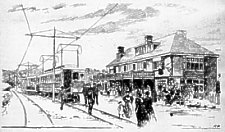
THIS STATION AND QUAINT INN, AT GROUDLE.
The Rev. John Quine, MA , the distinguished author of the successful new novel, " The Captain of the Parish," writes us as follows
" Goin' down to Laxey Ave! that's the way."
"The vale of Laxey has this testimony to its attractiveness, that even the native Manx all over the island make it their resort when taking a day's outing. The focus of attraction is Laxey Park. Here nature was indeed the architect. Man has but carried out the decoration and finish of her design. The Riviera of Manxland is here-nature's Riviera with the added charm of Riviera art. The owner of this place is a great traveller ; knows France, Switzerland; Italy, and has, so to speak, brought them home with him The saloons, balconies, verandahs, the tasteful decoration, the variety of trees, shrubs, and flowers-nay, the very sunshine and life of a continental holiday-are found in Laxey Park. Mr. Williamson, for many years a member of the little Manx Parliament, is the enterprising author of these developments. He knows, above all things, how to "cater for the public." "How to spend a happy day" is the problem he has set himself to solve; and Laxey Park is his solution of it. You make it your headquarters for the day. You visit King Orry's Grave, St. Patrick's Well, the Pool of Nikkesen in Glenroy, where Norse legend still lingers, or the Big Wheel, the Wash. and Snaefell, the monarch summit of the island. The shadows of evening find you in the Park again ; and a few- score paces from the Park gates you step "oil board" the electric cars to return to town."
Then, after Laxey is reached, there begins a new tour of equal, if not greater, interest. It is something, indeed, for a mere nothing of a fare, to have a champion railway ride up a high mountain ! Can human skill and energy go much further? And where is this mountain ? Set almost equidistant from England, Ireland, Scotland and Wales, which thus can each be seen, at all events oil a clear day. The Isle of Man is, of course, the fifth kingdom, and, there is yet another, as duly mentioned by our Editor last month. This whole view is so large and so comprehensive, that one is apt to forget its more immediate aspect, that is, the nearer objects :--the rugged, crooked, insinuating coast line; the other mountains from south to north Barrule ; the high roads; the nestling villages; the ships that pass in the day, and the golden glows of the Manx gorse. It would perhaps be as well to mention that of late the town of Laxey has been both sorrowfully and sympathetically in the public eye, because of its untoward mining disaster. Elsewhere is a photo. view of the entrance to the Snaefell mines, probably the only one ever published; the sketch of the great wheel, of course, marks the power of the old Laxey mines. As we all know, it is believed to be the largest wheel in the world; and if any of our readers should happen to come across Mr. Casement, the chief engineer of the steamer "Peveril" - a man of fluent language and reading, and versed in Manx locality and lore-they will find it was, I think, his grandfather who designed the wheel.
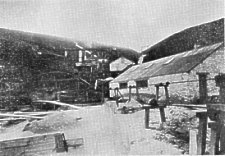
entrance to the Snaefell mines
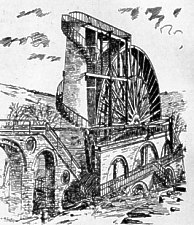
Big Wheel
** The Editor intends to regard all his readers as members of the above club, and he invites them to contribute any items of personal experience or otherwise; old travelling lore or reminiscenes, either original or copied, will be valued. Small prizes will occasionally be sent to senders of something really good.
MANX TRANSLATION PARADISE LOST
Mr. Brown sends to the Club the following extract from the letter of a Douglas friend:
" I begged an old Manx - scholar named Sayle to of correct the printer's errors in the 1796 edition. He agreed to do so on my supplying him with the writing paper required. Mr. Sayle assured me that all the finest passages in Paradise Lost have been translated, and all the 'nonsense' has been suppressed. On my asking him where the 'nonsense' is to be found, he replied 'Deed, there's a dale of nonsense in the English pome. I mane the foolish tales about Adam and Eve coortin' and such like. There's none of that nonsense in the Manx poethry-no indeed. A dale of Milton': Paradise Lost is nawthin' in the world but thrash. The Manx translation is fat shoopa}crier-particklerly them parts of the Pome tellin' about the fights between the divels and the angels-yes indeed. Aw man, it's rayly wondlherful-it's gran uncommon
SCRAP OF OLD DOUGLAS(1843) FROM THE SAME LETTER
"Have you seen that famous man Big Bills Cree the tailor oh?"
A Douglas tailor had a flourishing business. A tall, well-built jovial, good-looking man noted as a dancer, and a skilful equestrian rather eccentric and vain. He became on a spirited horse, robed in the gay habiliments of the Order, wearing a huge plumed hat with wide brim, his appearance excited the admiration and the risibility of the 'Dhoolish boees,' who vigorously sang his praises in the doggerel rhymes above referred to, to the tune of "Zob Roy, McGregor oh ! ' "
THE GOOD OLD TIMES.
"Mr. Grellier is remembered by a few as the Editor of The Sun. He is said to have been a man of considerable talent - a courtly diner out, of great conversational powers (thoughl almost as deaf as a post), a clever leader writer, an intimate friend of Professor Forbes, Lieut. Wood, Mr. Richard Quirk &c. These gentlemen dined frequently with Mr. Quirk at his house in St. Barnabas Square [off Fort Street], where many sharp ' wit-combats' occurred after dinner Professor Forbes used to crack jokes, and sketch droll caricatures of the company Lieut. Wood displayed his skill in legerdemain and in playing on the contra-basso, and Grellier shone as a brilliant conversationa list. No such gatherings in Douglas now.
I should think not! T.E.B.; Ibidem.
see also
FAMOUS PHOTOGRAPHERS. No. 3-Mr. George B. Cowen.
Camping in Onchan v3 p74/6 1899
A Palace of Delight v1 pp74/8 1897
Parts 4 + 5 From Duchess to Empress
A Ride on a Rope vol 1 pp178/181
|
|
||
|
|
||
|
Any comments, errors or omissions gratefully received The
Editor |
||